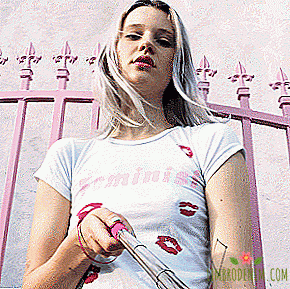Silent Epidemic: How Women Are Abused in LGBT Relationships
"We both came from a small town to Petersburg study and decide to rent a room together. The violence began as soon as we arrived, - says Christina (the name is chosen by the heroine). “I think that’s why it lasted long enough, almost half a year.” I always had bruises on my arms, almost every week she twisted my arms. A couple of times we had some serious fights. I was ashamed when a friend noticed a few bruises on her forearms several times. She was shorter than me, but for some reason much stronger, and I was not used to showing physical aggression. "

Dmitry Kurkin

The fact that the risk of facing the manifestations of domestic violence for non-heterosexual people is higher is not known the first year, and new studies confirm the results of previous ones. In 2010, a survey conducted by the US Ministry of Health showed that 43.8 percent of women in lesbian couples (in heterosexual women, the figure was 35 percent), as well as 26 percent of gay people, became victims of home abuses (beatings, rape and persecution). - men (for heterosexual men - 29 percent, but the authors of the study stipulate that the survey did not take into account gender identity). Similar results were found in the 2014 survey: 21.5 percent of men and 35.4 percent of women in same-sex couples compared with 7.1 percent of men and 20.4 percent of women in different sexes. (Among transgender people, this figure varies between 31 and 50 percent.) Thus, the percentages are changing, but not the general picture.
Nevertheless, the topic of violence in LGBT couples still remains on the periphery of the discussion about home abyus, almost invisible from the outside (the British county police in Greater Manchester, which recorded 775 cases of domestic violence in the LGBT community in the past year, only recently began to mention the victims as an essential detail for the case - before that it was clarified only in the case of hate crimes) and is rarely discussed inside.
"People who have fallen into violent relationships in LGBT + couples do not understand what is happening to them, since there is practically no information on this topic, and domestic violence is covered only from the point of view of manifestation in heteropairs," explains Polina Drobina, coordinator of fem-directions. Ekaterinburg Resource Center for LGBT. - And in general in the media space, the idea of victim labeling prevails: “I’m guilty_a” and “I know_a, what did I go to”. "
Domestic violence has neither gender nor sexuality, and, strictly speaking, the risk of abuse is not directly related to them: an abuzer can manifest itself in any pair (and not just a pair). However, the status of people who are obviously more vulnerable and socially deprived, leads to the fact that the problem becomes even more acute for LGBT people. "In society, it is condemned when a conditionally strong man beats a conditionally weak woman, but it is not clear what to do when you are two women in an" underground "relationship," says Christina.
The “minority stress” and the version that LGBT couples can copy the stereotypical hierarchical distribution of roles (by “male”, meaning dominance and aggression, and by “female”, passivity and dependence), the topic is not exhausted. Experts identify several reasons that can provoke violence in LGBT couples and determine its features.
Victimization
“I think that the attitude towards the topic of violence in the LGBT community is not very different from that in heteropairs. It's a shame to talk about it, perhaps even a little more embarrassing, because inner homophobia rejoices:“ And so are lesbians, they also fight ”,“ tells Nath (the name is chosen by the heroine).
Internal victimization is still strong in LGBT communities, whose members often convince themselves that their sexuality by default puts a label of a potential victim on them. This sensation is enhanced against the background of external homo-, bi-and transphobia: a logical construction "if I were not that way / that way, I would not have gotten into this situation" is more likely to become a dogma, if a person has already had a traumatic experience "punishments" for their orientation.
“Because of the position of society being broadcast,“ everything that is different from heterosexual, cis-gender, patriarchal ”is bad - often with calls to suppress what is not desired, a stable state of the learned Homo-bi, transphobia is formed in the LGBT + community. As a result, a person who has repeatedly heard from all sorts of negatively colored statements towards the LGBT + community begins to try them on himself, to be in constant pressure, ”explains Polina Zakirova, psychologist of the Resource Center.” And when faced with abusive manifesting, in a state of fear and stress, analyzing what is going on around him, may not find another explanation for what is happening with him. Abyzer himself can broadcast a similar point of view: “You yourself would choose, if you were with a woman, you would not suffer ...”
Sexual orientation, other than heterosexual, gender identity, different from cis, is perceived and imposed by society as an independent choice for which you have to pay, before - freedom, now - physical / psychological / emotional security. Thus, the responsibility with the abuzer is shifted to the affected person. "
Manipulation and threat of auting
"I always felt miserable and insignificant, constantly guilty of something, it seemed to me that I was doing something wrong, I didn’t say that way, I didn’t act that way, that I let it act like that, that means is to blame, ”recalls Wonderzine's interlocutor (she chose to remain anonymous).“ I read books on psychology, “worked on relationships,” which is to be understood - to no avail. I got up at the beginning of the platform, on the very edge, in the subway and thought to jump. .
In her case, it did not come to physical abuse, but the constant psychological abuse lasted for three years. “She dictated how to dress, criticized me if I donned something“ off topic ”. I was constantly broadcast that I was crooked, that I beat the dishes, that everything in my hands was breaking, that I was not adapted in life, that if she dumps, I will die in shit and hunger, unable to pay the communal flat. I believed. "
“I couldn’t see sex for months. Or rather, I was in a giving role and almost never in the host. I gave her pleasure, we hugged and went to bed. I didn’t talk about my physical pleasure. At the same time, I was guilty of not feminine. I don’t wear skirts, I don’t look like an ideal hourglass woman, I compared my feminine figure with my skinny one - I hated myself and my body. Then I was accused of not being positive enough, comparing to an ill girlfriend: even in the face of illness don't lose combat on system, but my sour face look sickening.
The abuzer itself can broadcast a similar point of view: “You yourself chose me, if you were with a woman, you wouldn’t suffer ...”
I was treated like a naughty child at public events. We went to festivals, and if I dared to say that I was hungry, a stream of reproaches fell on me that I had to eat at home. And if not eaten, then be patient, we have an event here. There was gaslighting, when I said that something offended for me, I was convinced that this was not the case and in general everything was not so. "
Abuse is not limited only to physical manifestations of violence - psychological manipulation can be no less destructive. "At the heart of the Abuse is not a thirst for violence, but a thirst for control. Physical violence and other means [of manipulation] serve to establish or strengthen control [of a partner]," says Beth Leventhal, an employee of prevention of domestic violence.
"As for the less obvious manifestations of abjuz (psychological and financial violence, social isolation, and so on), people who fall into such relationships may not be aware of what is happening to them, consider this the norm and treat this attitude as acceptable, says Polina Zakirova. - The position that is widespread in our society, about the need to “tolerate” any abusive manifestations, also fosters silence in people, regardless of sexual orientation and / or gender identity. "
At the heart of the Abuse is not a thirst for violence, but a thirst for control. Physical abuse serves to establish or strengthen control over a partner.
“B. constantly threatened to kill himself and inflicted injuries on himself when I offered to leave, and his relatives asked me to take care of his condition. He started writing that he could kill me too, as well as all my potential partners,” Oya says chosen by the heroine), recalling my relationship with FtM (female to male - male, who is assigned a female gender at birth). - At that time I had already identified the break in our relationship and did not hide the fact that I was in search of new ones. Of course, the topic jealousy it only aggravated. "Try not to h not on strike - he said -. If I see you on some tracks, I can think that they are owned by someone else, and then I'll have to delete them nazhdachkoy "".
By the usual for domestic tyranny methods of manipulation and emotional blackmail in same-sex couples added the threat of outing. In many cases, the fear of publicity turns out to be a strong enough reason not to leave the abusive relationship. “I had problems at work then, even the threat of dismissal due to the disclosure of my sexual orientation, so he could arrange a scene right under the windows of the organization — stand there and shout loudly that I am a whore, but he loves me,” Oya recalls .
“A closed LGBT + person is more likely to remain silent about violence in relationships,” confirms Vincent, coordinator of trans * -direction at the Resource Center.

Atmosphere of isolation
“I had no one to discuss it with: almost no one knew that I was in a homosexual relationship,” says Christina.
People who have experienced an abusive relationship often say that they could not leave the abuzer, because they simply had nowhere to leave. This problem is also characteristic of same-sex violence, with the amendment that the abuse victims usually have fewer places to escape. Including because abyuzery convince them that their acquaintances are homo-, bi- and transphobic. The feeling of isolation can also increase the situation when one of the partners seems to be “pushed” out of the community, accusing that it does not correspond to him, for example, that he is “not real gay”.
“Such issues are resolved independently, on their own: psychologists, psychotherapists, etc. Of course, parents can be told only if they accept and calmly relate to orientation. Since the fear of homophobic reaction from parents increases significantly, - says Nata. "Where did I go in such cases? To friends who support. To the therapist whenever possible. Parents found out about this because once they saw the bruise under the eye that did not have time to dissolve. All other traces are easily hidden, although I personally not much is done. When friends pay attention to scratches or bruises, involuntarily lowered his eyes. "
"I had no one to discuss it with: almost no one knew that I was in a homosexual relationship."
The atmosphere of isolation into which the victim of the abjuz falls is exacerbated by the indifferent or hostile attitude of others. Remembers Oya: "Sometimes it happened right on the street. The last time it happened, I said that I wanted to go home and be alone, and he bit my hand right through the autumn jacket to the blood and threw it on the iron fence so that it was on my back there were prints left. People, naturally, just walked by and didn't stop. "
People who experience violence in LGBT relationships often do not seek medical, legal and psychological help, because they do not believe that this can bring them any benefit. Polina Drobin from the Resource Center cites the following data: "Three hundred people filled out our questionnaire, and two hundred said they didn’t turn to lawyers or psychologists. Among those who turned to psychologists, sixteen noted positive changes, fifteen reported negative results. Of the three hundred who filled out the questionnaire, only two people applied for legal assistance. If we summarize the answers from respondent_ok, the main reason for not contacting people is that they don’t see the point and are afraid of running into incompetent specialists_k ".
Community silence
"Margaret invited me on a date the day after I broke up with the previous boyfriend," says Alice. "She was from a very liberal family, I realized that she had very good relations with her parents, no problem with that she was a lesbian, didn’t arise. We somehow quickly started spending a lot of time together, she always spent the night at my house and didn’t always ask if it was possible. She was jealous, oddly enough, of the mini-drawing club that we with friends came up with - just going on Wednesdays evening I, and painted still lifes from nature.
But we started to really quarrel because she constantly condemned me for my appearance. She said that I try to please everyone, I paint too much and dress too openly. Margaret herself really was not painted at all and dressed more like a gender neutral. And still shaved my head under 0.3. I liked it, but I myself did not want to look that way at that moment. Or could not.
After four months of constant quarrels and scandals, as well as total control on her part, I felt guilty for almost everything. But the apotheosis was the quarrel on the eve of the parade dedicated to Free the Nipple. Although I believed (and now I think) that there is nothing sacred in the female nipples, and I am completely incomprehensible to ban them, for example, on the instagram, at that moment I was not ready to walk around the city center topless. For Margaret it was very important, she was energetically engaged in activism. We notably quarreled, and at some point she just slammed me into the wall. And left. For some time I just sat and cried on the floor, not so much from resentment, as from a nervous shock. "
"For a while I just sat and cried on the floor, not so much from resentment, as from a nervous shock."
LGBT people admit that they are experiencing an acute shortage of the very talk in the community about violence. “I haven’t met a discussion of this topic either in narrow circles or in broad ones. As far as I know, LGBT bloggers do not discuss this either. Sometimes it seems to me that now everyone is trying to create only an idealized image of the community, for obvious reasons,” says Nata .
In an article by Atlantic, published five years ago, domestic violence in same-sex couples is called a "silent epidemic" - and the word "silent" in this definition is probably key. Violent survivors do not dare to talk about this within the LGBT community, fearing both misunderstanding and condemnation from other members, and the fact that publicity will make it difficult to find partners in the future or cast a shadow over the whole community.
"In my opinion, there is a tacit division of LGBT + communities - people who are more or less involved in activism, who visit community centers, subscribe to human rights and LGBT organizations on social networks, and people who are not interested in these issues live their own lives , communicate with a narrow circle of acquaintances, in their own private get-together, and this is enough for them, - Alla Chikinda, coordinator of the PR-service of the Resource Center, analyzes the situation. - If you take the first group of people, their attitude changes, I think, they are more aware pumped into psychologically and legally, they have a better chance of recognizing an aubus. People from the second group know almost nothing (and don’t want to know much), and their attitudes hardly change due to lack of awareness. When we asked different people to fill out our profile, we came across with such a reaction: “there are incomprehensible questions in the questionnaire,” “why bother to ask at all about this,” “what is the meaning of“ and so on. "
Arguing why the issue of domestic violence in LGBT couples is not accepted, Oya emphasizes that the abuse is often attributed to the specific features of the relationship: "Now, on the one hand, they talk a lot about the abuse and the dangers of toxic relationships, on the other - many things can be justified the phrase "this is just my kink". "
Photo: kuco - stock.adobe.com





